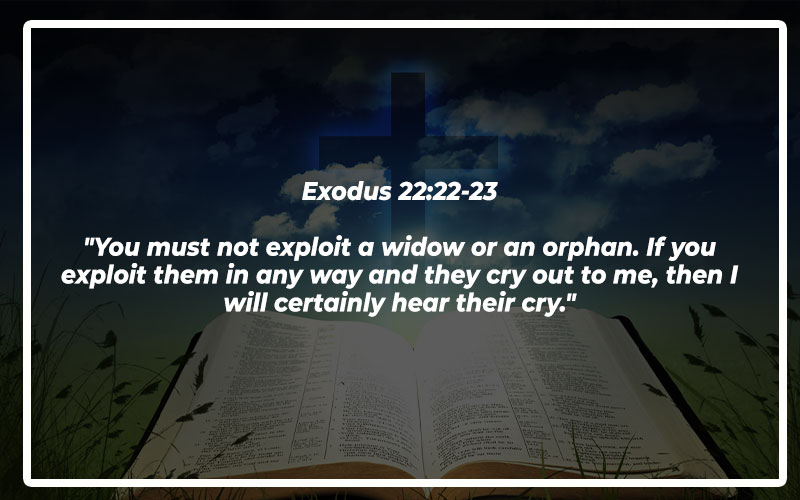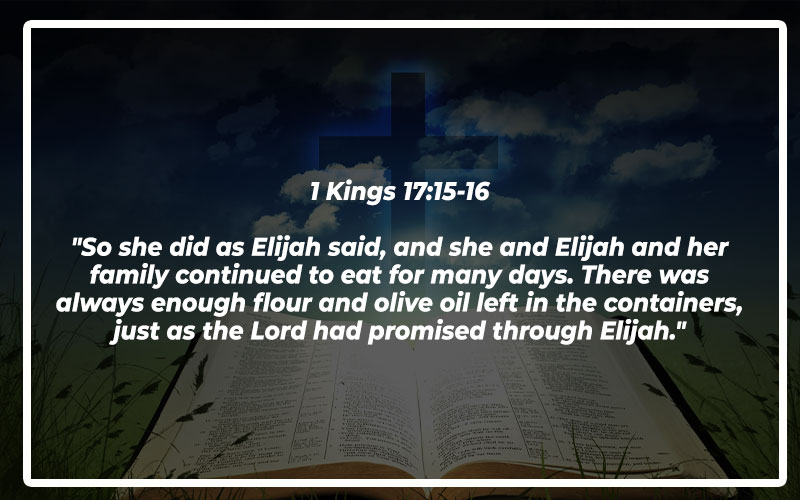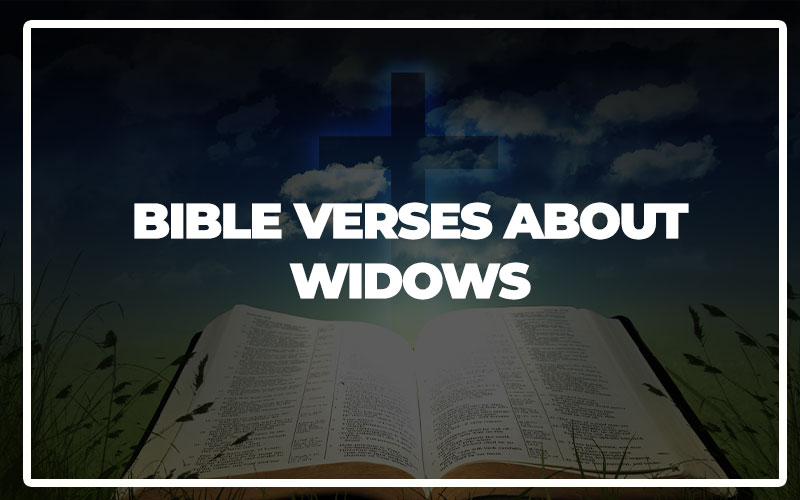Also Read: Bible Verses About Heart of a Woman
Top Bible Verses About Widows
Exodus 22:22-23
“You must not exploit a widow or an orphan. If you exploit them in any way and they cry out to me, then I will certainly hear their cry.”

This verse highlights God’s deep concern for the vulnerable, specifically widows and orphans. It underscores the importance of treating them with kindness and fairness, warning of divine retribution against those who exploit them. God’s commitment to justice and protection for the helpless is evident here.
Deuteronomy 10:18
“He ensures that orphans and widows receive justice. He shows love to the foreigners living among you and gives them food and clothing.”
In this passage, God is portrayed as a just and loving provider, especially for those in vulnerable positions such as orphans, widows, and foreigners. The verse calls believers to emulate God’s compassion and generosity by ensuring justice and provision for these groups.
Deuteronomy 24:17-18
“True justice must be given to foreigners living among you and to orphans, and you must never accept a widow’s garment as security for her debt.”
This verse instructs the Israelites to practice true justice, particularly towards foreigners, orphans, and widows. The specific prohibition against taking a widow’s garment as security underscores the need to protect and support those who are most vulnerable, ensuring they are not further disadvantaged.
Deuteronomy 27:19
“‘Cursed is anyone who denies justice to foreigners, orphans, or widows.’ And all the people will reply, ‘Amen.’”
This solemn declaration emphasizes the gravity of denying justice to the vulnerable, including widows. By pronouncing a curse on those who fail in this duty, it reinforces the community’s responsibility to uphold justice and care for those in need, reflecting God’s own commitment to justice.
Ruth 1:16
“But Ruth replied, ‘Don’t ask me to leave you and turn back. Wherever you go, I will go; wherever you live, I will live. Your people will be my people, and your God will be my God.'”
Ruth’s declaration to Naomi, a widow, showcases profound loyalty and love. It highlights the strong bonds that can form even outside of blood relations, and Ruth’s commitment to stay with Naomi and support her reflects a deep sense of duty and compassion towards widows.
Psalm 68:5
“Father to the fatherless, defender of widows—this is God, whose dwelling is holy.”
This verse describes God as a protector and defender of those without support, specifically mentioning widows. It assures believers that God is a reliable source of protection and care for the most vulnerable, reinforcing His holy and just nature.
Psalm 146:9
“The Lord protects the foreigners among us. He cares for the orphans and widows, but he frustrates the plans of the wicked.”
In this passage, God is depicted as actively caring for orphans and widows, ensuring their protection. By contrasting God’s care for the vulnerable with His opposition to the wicked, the verse emphasizes God’s commitment to justice and righteousness.
Proverbs 15:25
“The Lord tears down the house of the proud, but he protects the property of widows.”
This proverb highlights the contrast between the proud and the humble, specifically widows. It underscores God’s opposition to pride and His protective care for widows, ensuring their security and well-being.
Isaiah 1:17
“Learn to do good. Seek justice. Help the oppressed. Defend the cause of orphans. Fight for the rights of widows.”
Isaiah’s call to action emphasizes the importance of actively seeking justice and supporting the vulnerable, including widows. It calls believers to take a proactive stance in defending their rights, reflecting God’s own concern for justice and compassion.
Jeremiah 22:3
“This is what the Lord says: Be fair-minded and just. Do what is right! Help those who have been robbed; rescue them from their oppressors. Quit your evil deeds! Do not mistreat foreigners, orphans, and widows. Stop murdering the innocent!”
This verse calls for fair-mindedness and justice, specifically urging people not to mistreat widows. By including widows in the list of those who should be protected from oppression, it highlights their vulnerability and the importance of defending their rights.
Jeremiah 49:11
“But I will protect the orphans who remain among you. Your widows, too, can depend on me for help.”
God’s promise to protect orphans and widows emphasizes His role as a reliable helper for the vulnerable. This assurance of divine care encourages believers to trust in God’s provision and to also take up the cause of supporting those in need.
Ezekiel 22:7
“Fathers and mothers are treated with contempt. Foreigners are forced to pay for protection. Orphans and widows are wronged and oppressed among you.”
This verse condemns the mistreatment and oppression of vulnerable groups, including widows. It calls attention to societal injustices and the need for repentance and change, urging the community to align with God’s standards of justice and compassion.
Zechariah 7:10
“Do not oppress widows, orphans, foreigners, and the poor. And do not scheme against each other.”
This verse explicitly commands against oppressing widows and other vulnerable groups. By linking oppression with scheming, it highlights the importance of integrity and compassion in dealing with others, reflecting God’s heart for justice and mercy.
Malachi 3:5
“At that time I will put you on trial. I am eager to witness against all sorcerers and adulterers and liars. I will speak against those who cheat employees of their wages, who oppress widows and orphans, or who deprive the foreigners living among you of justice, for these people do not fear me, says the Lord of Heaven’s Armies.”
God’s declaration of judgment against those who oppress widows underscores His intolerance for injustice. This verse serves as a warning and a call to repentance, reminding believers of the serious consequences of failing to care for the vulnerable.
Matthew 23:14
“What sorrow awaits you teachers of religious law and you Pharisees. Hypocrites! For you shamelessly cheat widows out of their property and then pretend to be pious by making long prayers in public. Because of this, you will be severely punished.”
Jesus’ rebuke of the Pharisees for exploiting widows highlights the hypocrisy of appearing religious while committing injustices. This verse underscores the importance of genuine compassion and integrity, warning of severe consequences for those who exploit the vulnerable.
Mark 12:40
“Yet they shamelessly cheat widows out of their property and then pretend to be pious by making long prayers in public. Because of this, they will be more severely punished.”
Similar to Matthew 23:14, this verse condemns the religious leaders for their exploitation of widows. It serves as a powerful reminder that true piety involves justice and care for the vulnerable, not merely outward displays of religiosity.
Also Read: Bible Verses About Good Wife
Luke 2:37
“Then she lived as a widow to the age of eighty-four. She never left the Temple but stayed there day and night, worshiping God with fasting and prayer.”
This verse about the prophetess Anna, who was a widow, highlights her devotion and faithfulness. It serves as an example of how widows can lead lives of deep spirituality and commitment to God, finding purpose and fulfillment in worship and service.
Luke 7:12-13
“A funeral procession was coming out as he approached the village gate. The young man who had died was a widow’s only son, and a large crowd from the village was with her. When the Lord saw her, his heart overflowed with compassion. ‘Don’t cry!’ he said.”
Jesus’ compassion for the widow of Nain, whose only son had died, exemplifies His deep empathy and care for the suffering. This passage illustrates Jesus’ readiness to comfort and provide for the needs of widows, showcasing His loving and compassionate nature.
Luke 18:3
“A widow of that city came to him repeatedly, saying, ‘Give me justice in this dispute with my enemy.'”
The parable of the persistent widow emphasizes the importance of persistence in seeking justice. It highlights the determination and courage of the widow, encouraging believers to be persistent in their prayers and in advocating for justice.
Acts 6:1
“But as the believers rapidly multiplied, there were rumblings of discontent. The Greek-speaking believers complained about the Hebrew-speaking believers, saying that their widows were being discriminated against in the daily distribution of food.”
This verse reflects the early church’s awareness and concern for the fair treatment of widows. The complaint about discrimination underscores the importance of ensuring that widows receive equal and fair support within the community, prompting the church to address such issues.
Acts 9:39
“So Peter returned with them; and as soon as he arrived, they took him to the upstairs room. The room was filled with widows who were weeping and showing him the coats and other clothes Dorcas had made for them.”
This verse highlights the community of widows who were beneficiaries of Dorcas’ kindness and charity. It underscores the impact of compassion and service to widows, and how such acts of kindness can create strong bonds and support networks within the community.
Acts 9:41
“He gave her his hand and helped her up. Then he called in the widows and all the believers, and he presented her to them alive.”
Peter’s miracle of raising Dorcas back to life, witnessed by the widows, illustrates God’s power and care for His people. It also highlights the importance of the widows in the community, as they were directly involved in witnessing and celebrating the miracle.
1 Timothy 5:3
“Take care of any widow who has no one else to care for her.”
This verse provides a direct instruction to care for widows who are without support. It emphasizes the responsibility of the Christian community to look after the needs of widows, ensuring they are not left destitute and alone.
1 Timothy 5:5
“Now a true widow, a woman who is truly alone in this world, has placed her hope in God. She prays night and day, asking God for his help.”
This passage describes a true widow as one who is utterly reliant on God, highlighting her faith and prayer life. It shows the deep spiritual connection that widows can maintain with God, serving as an example of faithfulness and trust in His provision.
1 Timothy 5:16
“If a woman who is a believer has relatives who are widows, she must take care of them and not put the responsibility on the church. Then the church can care for the widows who are truly alone.”
This verse emphasizes the importance of family responsibility in caring for widows. It encourages believers to support their widowed relatives, ensuring the church’s resources are available for those without any family support.
James 1:27
“Pure and genuine religion in the sight of God the Father means caring for orphans and widows in their distress and refusing to let the world corrupt you.”
James highlights caring for orphans and widows as a hallmark of true religion. This verse underscores the importance of compassionate action and integrity, demonstrating that genuine faith involves actively supporting the vulnerable.
1 Kings 17:9
“Go and live in the village of Zarephath, near the city of Sidon. I have instructed a widow there to feed you.”
This verse recounts God’s command to Elijah to seek provision from a widow during a famine. It highlights God’s provision through unlikely means and the widow’s role in God’s plan, demonstrating His care and provision for both the prophet and the widow.
1 Kings 17:12
“But she said, ‘I swear by the Lord your God that I don’t have a single piece of bread in the house. And I have only a handful of flour left in the jar and a little cooking oil in the bottom of the jug. I was just gathering a few sticks to cook this last meal, and then my son and I will die.'”
The widow of Zarephath’s dire situation highlights the severity of her need. Her encounter with Elijah demonstrates faith and trust in God’s provision, ultimately leading to a miraculous supply of food, showcasing God’s compassion and power.
1 Kings 17:15-16
“So she did as Elijah said, and she and Elijah and her family continued to eat for many days. There was always enough flour and olive oil left in the containers, just as the Lord had promised through Elijah.”

The miraculous provision of food for the widow of Zarephath, Elijah, and her family illustrates God’s faithfulness in fulfilling His promises. It underscores the importance of obedience and trust in God’s word, even in desperate circumstances.
Job 29:13
“I helped those without hope, and they blessed me. And I caused the widows’ hearts to sing for joy.”
Job’s reflection on his past actions includes his care for widows, which brought them joy. This verse highlights the profound impact that acts of kindness and support can have on the lives of widows, bringing hope and happiness to their hearts.
Job 31:16
“Have I refused to help the poor, or crushed the hopes of widows?”
Job’s rhetorical question emphasizes his commitment to helping the poor and widows. It underscores the importance of ensuring that the needs and hopes of widows are not neglected, reflecting a life of righteousness and compassion.
Isaiah 10:2
“They deprive the poor of justice and deny the rights of the needy among my people. They prey on widows and take advantage of orphans.”
This verse condemns those who exploit widows and orphans, highlighting God’s disdain for injustice and exploitation. It serves as a call to defend the rights of the needy and protect the vulnerable from oppression and abuse.
Jeremiah 7:6
“Only if you stop exploiting foreigners, orphans, and widows; only if you stop your murdering; and only if you stop harming yourselves by worshiping idols.”
Jeremiah’s call for repentance includes stopping the exploitation of widows. This verse links social justice with true worship, indicating that caring for the vulnerable is integral to a righteous and faithful life before God.
Lamentations 5:3
“We are orphaned and fatherless. Our mothers are widowed.”
This lament reflects the sorrow and hardship faced by orphans and widows in a time of national crisis. It highlights their vulnerability and the need for community support and divine intervention to alleviate their suffering.
Also Read: Bible Verses About Going To Heaven
What Does the Bible Say About Widows
The Bible holds widows in high regard, emphasizing the importance of caring for them with kindness and respect. Widows often face hardship, especially in ancient times when a woman without a husband had limited means of support. Because of this, God commands His people to look after widows, ensuring they are not neglected or mistreated.
In the Bible, there are many stories and teachings that highlight the special place widows have in God’s heart. They are seen as vulnerable members of society who need protection and care. The Bible encourages believers to provide for widows, showing love and compassion to them. This includes offering them financial support, emotional comfort, and practical assistance.
The early church also took this responsibility seriously. Believers were instructed to look after widows in their community, ensuring their needs were met. This reflects God’s own care for those who are in difficult situations. God is described as a defender of widows, showing that He is deeply concerned about their well-being.
Jesus, too, showed great compassion for widows. His interactions with them demonstrate that they are valuable and worthy of honor. By helping and caring for widows, believers follow Jesus’ example and live out their faith in practical ways.
In summary, the Bible teaches that widows should be treated with great care and respect. They hold a special place in God’s heart, and His people are called to support and protect them. This reflects God’s love and justice, showing that He cares deeply for those who are vulnerable and in need. By caring for widows, believers can demonstrate their faith and obedience to God’s commands.

